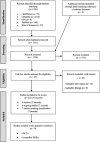The effectiveness of clinical guideline implementation strategies in oncology-a systematic review
- PMID: 37024867
- PMCID: PMC10080872
- DOI: 10.1186/s12913-023-09189-x
The effectiveness of clinical guideline implementation strategies in oncology-a systematic review
Abstract
Importance: Guideline recommendations do not necessarily translate into changes in clinical practice behaviour or better patient outcomes.
Objective: This systematic review aims to identify recent clinical guideline implementation strategies in oncology and to determine their effect primarily on patient-relevant outcomes and secondarily on healthcare professionals' adherence.
Methods: A systematic search of five electronic databases (PubMed, Web of Science, GIN, CENTRAL, CINAHL) was conducted on 16 december 2022. Randomized controlled trials (RCTs) and non-randomized studies of interventions (NRSIs) assessing the effectiveness of guideline implementation strategies on patient-relevant outcomes (overall survival, quality of life, adverse events) and healthcare professionals' adherence outcomes (screening, referral, prescribing, attitudes, knowledge) in the oncological setting were targeted. The Cochrane risk-of-bias tool and the ROBINS-I tool were used for assessing the risk of bias. Certainty in the evidence was evaluated according to GRADE recommendations. This review was prospectively registered in the International Prospective Register of Systematic Reviews (PROSPERO) with the identification number CRD42021268593.
Findings: Of 1326 records identified, nine studies, five cluster RCTs and four controlled before-and after studies, were included in the narrative synthesis. All nine studies assess the effect of multi-component interventions in 3577 cancer patients and more than 450 oncologists, nurses and medical staff.
Patient-level: Educational meetings combined with materials, opinion leaders, audit and feedback, a tailored intervention or academic detailing may have little to no effect on overall survival, quality of life and adverse events of cancer patients compared to no intervention, however, the evidence is either uncertain or very uncertain.
Provider-level: Multi-component interventions may increase or slightly increase guideline adherence regarding screening, referral and prescribing behaviour of healthcare professionals according to guidelines, but the certainty in evidence is low. The interventions may have little to no effect on attitudes and knowledge of healthcare professionals, still, the evidence is very uncertain.
Conclusions and relevance: Knowledge and skill accumulation through team-oriented or online educational training and dissemination of materials embedded in multi-component interventions seem to be the most frequently researched guideline implementation strategies in oncology recently. This systematic review provides an overview of recent guideline implementation strategies in oncology, encourages future implementation research in this area and informs policymakers and professional organisations on the development and adoption of implementation strategies.
Keywords: Behaviour; Clinical practice guideline; Guideline adherence; Healthcare professionals; Implementation; Oncology; Patient-relevant outcomes.
© 2023. The Author(s).
Conflict of interest statement
None known.
Figures
Similar articles
-
Non-clinical interventions for reducing unnecessary caesarean section.Cochrane Database Syst Rev. 2018 Sep 28;9(9):CD005528. doi: 10.1002/14651858.CD005528.pub3. Cochrane Database Syst Rev. 2018. PMID: 30264405 Free PMC article.
-
Patient-mediated interventions to improve professional practice.Cochrane Database Syst Rev. 2018 Sep 11;9(9):CD012472. doi: 10.1002/14651858.CD012472.pub2. Cochrane Database Syst Rev. 2018. PMID: 30204235 Free PMC article.
-
Telehealth interventions: remote monitoring and consultations for people with chronic obstructive pulmonary disease (COPD).Cochrane Database Syst Rev. 2021 Jul 20;7(7):CD013196. doi: 10.1002/14651858.CD013196.pub2. Cochrane Database Syst Rev. 2021. PMID: 34693988 Free PMC article.
-
Systemic pharmacological treatments for chronic plaque psoriasis: a network meta-analysis.Cochrane Database Syst Rev. 2017 Dec 22;12(12):CD011535. doi: 10.1002/14651858.CD011535.pub2. Cochrane Database Syst Rev. 2017. Update in: Cochrane Database Syst Rev. 2020 Jan 9;1:CD011535. doi: 10.1002/14651858.CD011535.pub3. PMID: 29271481 Free PMC article. Updated.
-
Continuing education meetings and workshops: effects on professional practice and healthcare outcomes.Cochrane Database Syst Rev. 2021 Sep 15;9(9):CD003030. doi: 10.1002/14651858.CD003030.pub3. Cochrane Database Syst Rev. 2021. PMID: 34523128 Free PMC article.
Cited by
-
Use of Implementation Strategies to Promote the Uptake of Knee Osteoarthritis Practice Guidelines and Improve Patient Outcomes: A Systematic Review.Arthritis Care Res (Hoboken). 2024 Sep;76(9):1246-1259. doi: 10.1002/acr.25353. Epub 2024 May 28. Arthritis Care Res (Hoboken). 2024. PMID: 38706141
-
Systematic review of clinical practice guidelines for long-term breast cancer survivorship: assessment of quality and evidence-based recommendations.Br J Cancer. 2025 Aug;133(2):178-193. doi: 10.1038/s41416-025-03059-5. Epub 2025 May 17. Br J Cancer. 2025. PMID: 40382523 Free PMC article.
-
Contemporary approaches in the peri-endoscopic management of antithrombotic agents: current paradigms, challenges, and prognostications.Therap Adv Gastroenterol. 2025 Jun 26;18:17562848251346869. doi: 10.1177/17562848251346869. eCollection 2025. Therap Adv Gastroenterol. 2025. PMID: 40583972 Free PMC article. Review.
-
Factors influencing fidelity to guideline implementation strategies for improving pain care at cancer centres: a qualitative sub-study of the Stop Cancer PAIN Trial.BMC Health Serv Res. 2024 Aug 22;24(1):969. doi: 10.1186/s12913-024-11243-1. BMC Health Serv Res. 2024. PMID: 39174979 Free PMC article. Clinical Trial.
-
Interdisciplinary Management of Cardiotoxicity in Outpatient Settings: A Survey on Practices, Perceptions and Potential for Improvement.Eur Cardiol. 2025 Feb 13;20:e02. doi: 10.15420/ecr.2023.49. eCollection 2025. Eur Cardiol. 2025. PMID: 40027994 Free PMC article.
References
-
- Institute of Medicine (US) Committee on Standards for Developing Trustworthy Clinical Practice Guidelines. Clinical Practice Guidelines We Can Trust. Graham R, Mancher M, Miller Wolman D, Greenfield S, Steinberg E, editors. Washington (DC): National Academies Press (US); 2011. PMID: 24983061. - PubMed
-
- Wiering B, Lyratzopoulos G, Hamilton W, Campbell J, Abel G. Concordance with urgent referral guidelines in patients presenting with any of six 'alarm' features of possible cancer: a retrospective cohort study using linked primary care records. BMJ Qual Saf. 2022;31(8):579–589. doi: 10.1136/bmjqs-2021-013425. - DOI - PMC - PubMed
Publication types
MeSH terms
LinkOut - more resources
Full Text Sources





